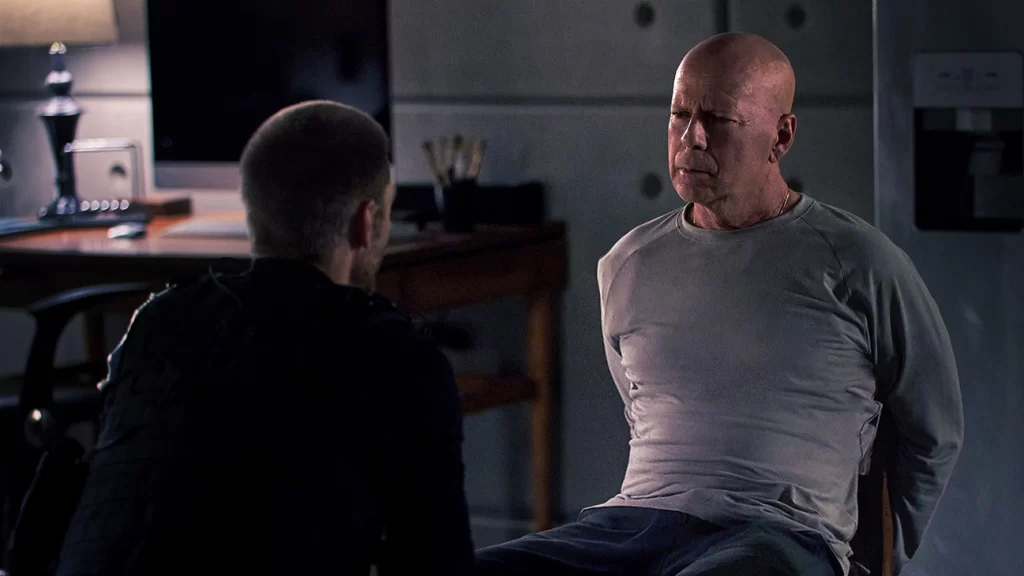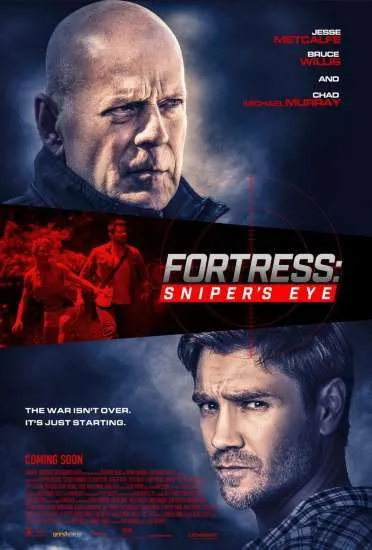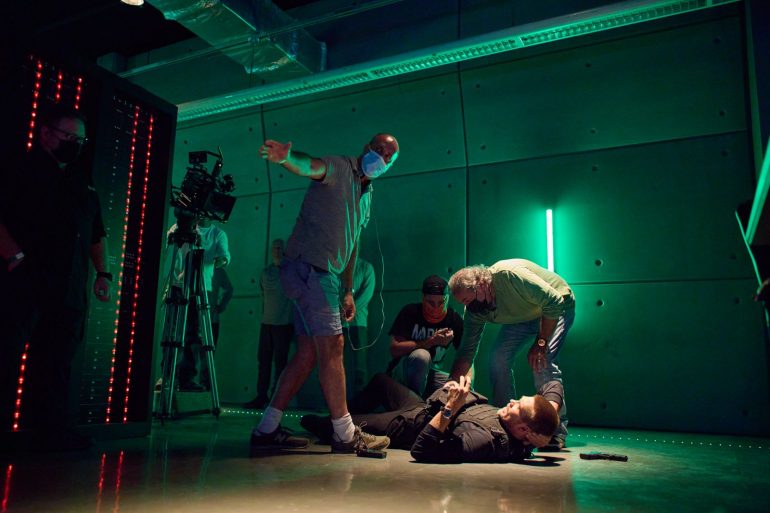Josh Sternfeld is the director of the latest Bruce Willis picture Fortress: Sniper’s Eye, the sequel to 2021’s Fortress.
In Fortress: Sniper’s Eye Bruce Willis (Pulp Fiction), continues the adventure begun in Fortress. Weeks after the deadly assault on Fortress Camp, Robert (Bruce Willis) makes a daring rescue to save Sasha, the widow of his old nemesis, Balzary (Chad Michael Murray, “One Tree Hill”). But back in the camp’s command bunker, it appears Sasha may have devious plans of her own, and as a new attack breaks out, Robert is confronted with a familiar face he thought he’d never see again.
Josh stops by to talk about the film.
Today we’re discussing your new film Fortress: Sniper’s Eye, which is a sequel to last year’s Fortress starring Bruce Willis; what was it that appealed about the script?
To be honest, I really connected with the combination of the drama, the character development of the family and the relationships. It also had really great action scenes that I thought were going to be super fun to shoot. I’d never done an action movie before, and I wanted to do one for a while. When I read this script, it just felt like the perfect way to start. I knew one of the executive producers socially, and he knew that I wanted to do an action movie so he sent it to me and I just loved it.
How did you go about creating the action scenes?
Well, I knew from my prior films, which were more dramas with some thriller elements. I knew that preparation was going to be key. So I did; as soon as I got to Puerto Rico, I immediately got in touch with the stunt coordinator and told him to hire everybody and start rehearsing immediately. I mean, we only had about, I want to say, like two to three weeks of pre-production, so preparation was a big part of it. I would have him show me little iPhone videos of the rehearsals with the stunt teams. Then when we got on set, it’s the real creative work of finding the camera angles, which was a great learning experience for me. It was a great challenge and with the action scenes, the other thing that I learnt very quickly is that just because the stunt teams and even the principal players know all of the choreography, it still takes time on set for it to come alive in a visceral way. So that was an interesting challenge given the fast-shooting schedule but I think all the actors and the stunt teams did marvelously.

Was it daunting coming on board on the second entry in a franchise, or were you just excited to give your voice to it?
I was super excited because it was a little bit odd how it materialized. I read the second script before I read the first script, so I got a hold of the second script and the producer said, “Do you want to maybe do this?” I read the second script and I really loved again this kind of combination of the drama, the sort of emotionalism of it and the action. Then I said, “Well, can I see the first script?” When I saw the first script, I saw that it was a very, very different kind of film. So I immediately kind of knew even before I got there, that this was going to be a very different movie. It was a very, very different screenplay than the first screenplay, and I’ve since seen the first film, and I think it’s great. I think James did great. I didn’t know James at all, personally or professionally. We didn’t communicate because it was so hectic a schedule, but I wasn’t worried about it because the second screenplay was so different when I started talking to the actors. They all wanted to do different things with their characters this time. So that also sort of made me kind of relaxed and confident that I could do it.
I noticed that myself, particularly with Michael Sirow who plays Ken Blain; you worked with him on Meskada before. In the first Fortress movie, he was very much the comic relief but in the second one, I thought he was more serious. Was that deliberate?
So we talked at length about that. I have a personal friendship with Michael that goes back many years and we talked at length about that and ironically some of the conversations with both Jesse and Chad were a little bit similar, which we were just in so far as the first film. The way the first film ends is in this very cataclysmic way and they all wanted to take a beat at the beginning of the second film to re-explore their characters in a new direction. With Mike, that was definitely the case. The other thing with Mike, we knew that in the second half of the film, he goes through such a kind of interior journey that he wanted to play it more seriously and I absolutely thought that was the right choice. Even though I thought it in the first film, I thought he made great choices too. With all of the actors, to be honest, and that was really the case. They all read this script and they all came to me individually and said, “I really want to do something different with the character this time”, and I always thought it worked and they were all incredible. Mike was the only actor I had worked with before. Everybody knows Bruce’s work for decades. I knew very little of the work of Chad Michael Murray or Jesse Metcalf. I knew that they were respected actors and I had heard of them but I didn’t really know their work a lot, and I just was so impressed with them.
Bruce Willis recently announced his retirement; how did you find working with him?
It was fantastic. I mean, obviously at the time, I didn’t know that this was going to be materializing. I found him completely, just an honour and a pleasure to work with. He was cool. He was laid back. He was professional. He was very relaxed and charismatic. We absolutely communicated directly on set. It was just a dream come true for me. I found him completely present in working together. So there was nothing I had to complain about at all.
Yeah. Because you were on a tight shooting schedule, does that mean you had to stick rigorously to the script or did you still allow some improvisation?
I mean, sometimes you allow some dialogue and improvisation. I never mind if actors want to change dialogue, really, unless it’s very obviously important dialogue to the narrative elements. There were some changes in dialogue, but you do have to stick fairly closely with the narrative arc and the scenes because also with this kind of rigorous schedule where you’re doing sometimes more than nine pages a day. You know that you’re not going to have a lot of extra footage at the end, or a ton of extra scenes to leave on the cutting room floor. I was sort of attuned to that. Luckily I was working with a DP who I also didn’t know before I got there, who was super experienced, Vern Noble’s a really great DP and has had a super long career, first as a cameraman and then as a second unit DP and now a DP. He was just working unbelievably quickly, even with lighting, which is rare with DPs but it was great.

Although there wasn’t much on the cutting room floor, was there anything in the initial script that you regretted having to leave or was did it turn out the way you wanted it to?
It turned out the way I wanted it to and I thought it was a marvellous script but I have to be honest, I did a little bit of work on the screenplay in the end, the week or so leading up to the shoot. It was most evidenced in a couple of the scenes with descriptions of the cyber activity where in the screenplay there were a few scenes, with Chad and Jesse, where I thought the cyber activity explanations of what had happened to Balzary’s money and how he was going to get it back and where it was found in the script. It was a little bit verbose. It was a little bit too complex for me so I did work on kind of paring down the rationales, so to speak, of the cyber activity. I was happy to have done that and the actors liked it. But no, by and large, I thought the script was very solid. The action scenes you’re trying to realise as fully as you can realise because very often on the page for these action scenes, it’s a lot of exclamation points for them. It’s just like crazy stuff. You give it to the stunt coordinator and then they really start to flesh it out, like what the moves are going to look like. That’s why I thought the preparation and the rehearsals were going to be so crucial. So that really is a process but it was a super fun challenge.
Generally, what do you look for whenever a script comes in front of you to make you interested in it?
I’m generally looking for well, two things. So the first thing you’re looking for is evidence of passion for the material in the writer which if you read enough screenplays over enough years, you sort of develop a bit of an instinct for that over years and years. You’re looking for evidence that the writer really cares about this. It’s not that they have to know everything perfectly, and it’s not even always. It rarely is that it’s perfectly constructed. There’s almost always work, but what you’re looking for is that the writer really cares about it. The other thing I really often look for is some angle into it that allows for some originality.
With this it was really perfect and I saw that the beginning of the film and the dramatic material was going to help me energize the second half of the film, just in my own mind. So that felt like a great combination and I was like, “All right, wow, I can do this” and it’s totally true. If the second screenplay had really just been like a replica of the first one, I don’t think I would have been interested. I’m sure they would have found another great director for it, but I don’t know that I would have wanted to do it if the second screenplay was just kind of like the same thing again. It was the fact that it was a markedly different story. The second time it helped me realise the action sequences because there were a lot of different action sequences in different locales and with different talent so that helped.
The last thing was the fact that all of the actors were super committed to realising the action scenes in a very real way, which is also helpful because I didn’t know that in advance. Never having done it before, I wasn’t sure what the attitude of the actors to the action sequences was going to be. You don’t know if they’re going to just be like, “Oh, this is more like gymnastics, and this is more just like pyrotechnics” but they were all very, very, very committed to making them very real.
Having done your first action movie, would you be interested in returning to the genre again in the future?
Oh, for sure. I currently don’t have an agent, but I do have producers that talk to me and I’m telling everybody that I absolutely want to do another action film next. I just loved it. I loved the physicality of it. I loved the challenge of matching the camera to the action. I think like anything with filmmaking you get more adept at it the more you do it. So I would love it.
Finally, what would you like audiences to take from the film?
I would love audiences to feel this as part of the tradition of action films that I love, which are action films where not only are you excited and energized by the action scenes, but you’re really invested in the emotional arc and the humanity of the characters. That was what I attempted to do. Obviously it’ll be up to you and the audiences to decide how successful or not I was. But that’s what I would want to say.
Lionsgate will release the action/thriller film FORTRESS: SNIPER’S EYE available in Select Theaters, On Digital and On Demand on April 29, 2022!






